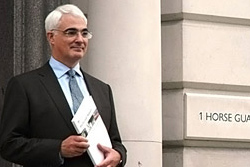Budget introduces broadband tax, loans for SMBs
The pre-election budget focused on banks and recovery, but also introduced the 50 pence broadband tax.


Alistair Darling officially introduced the 50 pence broadband tax to parliament today, as he unveiled the Labour government's last budget before an election.
The broadband tax, created as part of the Digital Economy Bill currently being pushed through parliament, was introduced in a few brief lines.
"Access to high-speed broadband is essential to deliver these goals," Darling said, referring to goals to boost innovation and competition in the UK.
"We have taken the decision to ensure the benefits are spread to rural as well as urban areas and are not limited to the better off," he added.
"The 50 pence monthly landline duty will unlock private investment and enable 90 per cent of the country to access the next generation of super-fast broadband by 2017," he said.
Prime Minister Gordon Brown earlier this week promised superfast broadband across the UK by 2020.
Support for SMBs
Get the ITPro daily newsletter
Sign up today and you will receive a free copy of our Future Focus 2025 report - the leading guidance on AI, cybersecurity and other IT challenges as per 700+ senior executives
Small businesses saw some attention in the form of tax breaks and more bank loans.
Darling said that RBS and Lloyds have promised 94 billion in new bank loans, with half going to SMBs. The government will also set up a new UK Finance For Growth body, to help support SMBs and dole out the 4 billion in financial support given to small firms.
The Government will also boost the amount of central government contracts given to SMBs by 15 per cent. "This could mean new business worth an extra 3 billion from central government alone and up to 15 billion across the wider public sector," Darling said.
He also promised that 80 per cent of invoices would be paid within five days.
Darling also said the Government would give SMBs more time to pay taxes, doubled the investment allowance to 100,000 and doubled relief for Capital Gains Tax.
He said it would offer "better access to finance, improved procurement, lower taxes and more time to pay them... benefiting hundreds of thousands of small businesses providing the backbone of future economic growth and jobs."
Among other tech-related announcements, the budget also promised to create 20,000 university places predominately in maths, science, technology and engineering and announced the creation of a green investment bank.
Freelance journalist Nicole Kobie first started writing for ITPro in 2007, with bylines in New Scientist, Wired, PC Pro and many more.
Nicole the author of a book about the history of technology, The Long History of the Future.
-
 Should AI PCs be part of your next hardware refresh?
Should AI PCs be part of your next hardware refresh?AI PCs are fast becoming a business staple and a surefire way to future-proof your business
By Bobby Hellard
-
 Westcon-Comstor and Vectra AI launch brace of new channel initiatives
Westcon-Comstor and Vectra AI launch brace of new channel initiativesNews Westcon-Comstor and Vectra AI have announced the launch of two new channel growth initiatives focused on the managed security service provider (MSSP) space and AWS Marketplace.
By Daniel Todd
-
 Starmer bets big on AI to unlock public sector savings
Starmer bets big on AI to unlock public sector savingsNews AI adoption could be a major boon for the UK and save taxpayers billions, according to prime minister Keir Starmer.
By George Fitzmaurice
-
 UK government targets ‘startup’ mindset in AI funding overhaul
UK government targets ‘startup’ mindset in AI funding overhaulNews Public sector AI funding will be overhauled in the UK in a bid to simplify processes and push more projects into development.
By George Fitzmaurice
-
 UK government signs up Anthropic to improve public services
UK government signs up Anthropic to improve public servicesNews The UK government has signed a memorandum of understanding with Anthropic to explore how the company's Claude AI assistant could be used to improve access to public services.
By Emma Woollacott
-
 The UK’s AI ambitions face one major hurdle – finding enough home-grown talent
The UK’s AI ambitions face one major hurdle – finding enough home-grown talentNews Research shows UK enterprises are struggling to fill AI roles, raising concerns over the country's ability to meet expectations in the global AI race.
By Emma Woollacott
-
 US government urged to overhaul outdated technology
US government urged to overhaul outdated technologyNews A review from the US Government Accountability Office (GAO) has found legacy technology and outdated IT systems are negatively impacting efficiency.
By George Fitzmaurice
-
 Government urged to improve tech procurement practices
Government urged to improve tech procurement practicesNews The National Audit Office highlighted wasted money and a lack of progress on major digital transformation programmes
By Emma Woollacott
-
 Government says new data bill will free up millions of hours of public sector time
Government says new data bill will free up millions of hours of public sector timeNews The UK government is proposing new data laws it says could free up millions of hours of police and NHS time every year and boost the UK economy by £10 billion.
By Emma Woollacott
-
 Online Safety Act slammed by rights groups as bill gains royal assent
Online Safety Act slammed by rights groups as bill gains royal assentNews The Online Safety Act has been described as a veiled attempt to secure access to encrypted messages
By Rory Bathgate